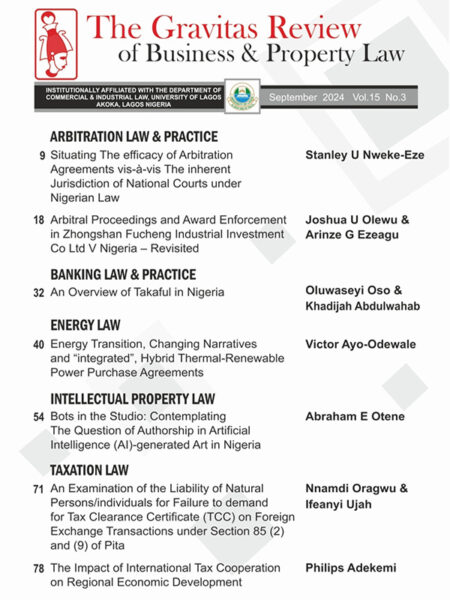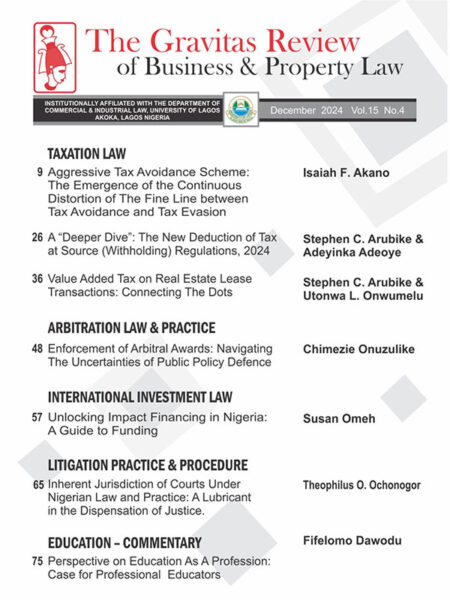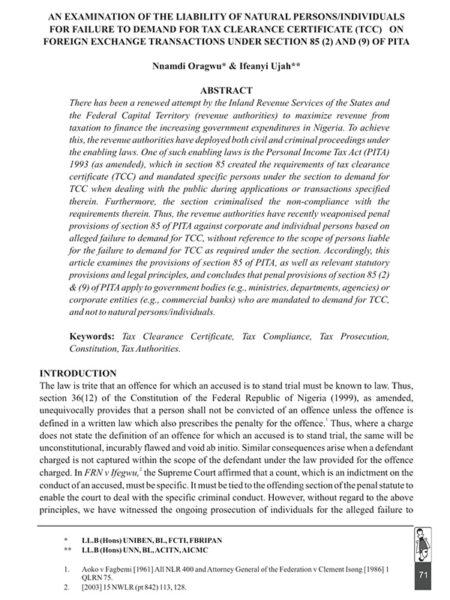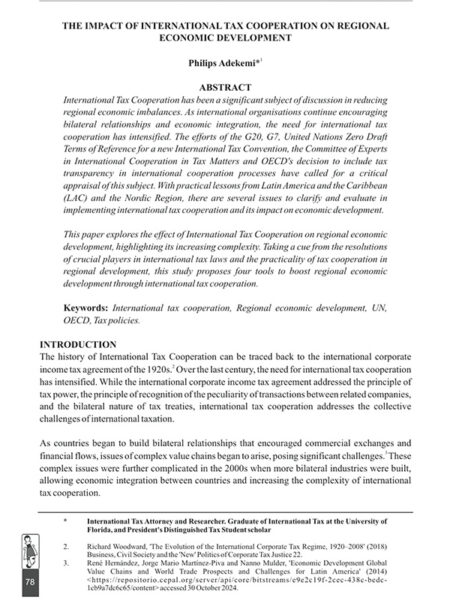-

Aggressive Tax Avoidance Scheme: The Emergence of the Continuous Distortion of the Fine Line Between Tax Avoidance and Tax Evasion
0₦2,500.00Isaiah Akano in his article, Aggressive Tax Avoidance Scheme: The Emergence of the Continuous Distortion of the Fine Line Between Tax Avoidance and Tax Evasion, explores the thin line between Tax Avoidance and Tax Evasion. Tax is one of the major sources of revenue of the government in Nigeria. As a matter of fact, at the inception of the year 2024, the Federal Government tasked the Federal Inland Revenue Service to generate a whopping sum of N19.4 trillion which amounts to about sixty percent increase from the sum of N12.3 trillion generated by it in 2023 in a bid to raise the overall government revenue as a percentage of the Gross Domestic Product (GDP) to 25% . The revenues are meant to be generated from individuals, companies and other legal entities through tax. Hence, there is a need for citizens and corporate bodies to arrange their affairs in such a way that they can attract a minimal tax, especially in view of the harsh economic condition in the country, high inflation rate, the weak value of the naira and high interest rate on loans which most businesses resorted to, as their major source of capital. Tax lawyers, Accountants and other tax consultants had at different times proffered different ‘tax avoidance schemes’ to their clients. Some of the Schemes are aggressive and complex in nature and there are instances wherein they were eventually interpreted by the Court to amounting to tax evasion. Akano seeks to take a critical look at the line of differences between tax avoidance and tax evasion and also discuss the continuous distortion of same as a result of the advent of aggressive tax avoidance schemes in recent years.
-

A “Deeper Dive”: The New Deduction of Tax at Source (Withholding) Regulations, 2024
0₦2,500.00Stephen Arubike and Adeyinka Adeoye in their article, A “Deeper Dive”: The New Deduction of Tax at Source (Withholding) Regulations, 2024, provide a comprehensive analysis of the Deduction of Tax at Source (Withholding) Regulations, 2024 (the “Regulations”), issued by Nigeria’s Minister of Finance and the Coordinating Minister of the Economy. Effective from January 1, 2025, the Regulations replace previous regulations on the subject, introduce several significant changes to the country’s withholding tax (WHT) regime. Key provisions include adjustments to applicable tax rates, expanded coverage of taxable entities, and a new emphasis on taxpayer identification numbers (TINs) to drive compliance. Arubike and Adeoye also address critical legal concerns raised by the Regulations, including conflicts with primary statutes, overreach in the Minister’s authority, and the unfair imposition of penalties on non-resident companies. While the Regulations aim to simplify WHT processes, reduce tax burdens on small businesses, and enhance tax compliance, several ambiguities and issues remain, particularly regarding non-resident taxation and penalties for non-compliance. Arubike and Adeoye conclude by discussing the transition period and its potential implications, as well as the need for further clarification on certain provisions to ensure fairness and legal consistency in implementing the Regulations.
-

Value Added Tax on Real Estate Lease Transactions: Connecting the Dots
0₦2,500.00In their article, Value Added Tax on Real Estate Lease Transactions: Connecting the Dots, Stephen Arubike and Utonwa Onwumelu tackle the application of Value Added Tax (VAT) to real estate lease transactions. Whilst VAT payment in Nigeria is limited to supplies of either “goods” or “services”, the law only exempts from VAT “goods” or “services” that are explicitly listed in the statute. The failure to define the terms “goods” or “services” prior to 2019 led to the conclusion in some judicial decisions that lease transactions are subject to VAT because neither lease nor interest in land is explicitly exempt from VAT. Arubike and Onwumelu aim to explore the historical context of ‘the absence of precise definition’ controversy, the rationale behind judicial interpretations, the impact of the Finance Acts 2019, 2020 and 2023 in resolving these definition issues and their practical implications.
-

The Gravitas Review of Business & Property Law Vol.15 No.4 – Print
0₦5,000.00In this issue of The Gravitas Review of Business & Property Law Vol.15 No.4, there are well researched articles on:
- Taxation
- Arbitration Law & Practice
- International Investments
- Litigation Practice & Procedure
- Education – Commentary
-

The Gravitas Review of Business & Property Law Vol.15 No.4 – E-Book
0₦5,000.00In this issue of The Gravitas Review of Business & Property Law Vol.15 No.4, there are well researched articles on:
- Taxation
- Arbitration Law & Practice
- International Investments
- Litigation Practice & Procedure
- Education – Commentary
-

The Gravitas Review of Business & Property Law Vol.15 No.4
0₦5,000.00In this issue of The Gravitas Review of Business & Property Law Vol.15 No.4, there are well researched articles on:
- Taxation
- Arbitration Law & Practice
- International Investments
- Litigation Practice & Procedure
- Education – Commentary
-

The Gravitas Review of Business & Property Law Vol.15 No.3 – Print
0₦5,000.00In this issue of The Gravitas Review of Business & Property Law Vol.15 No.3, there are well researched articles on:
- Arbitration Law & Practice
- Banking Law & Practice
- Energy Law
- Intellectual Property Law
- Taxation
-

The Gravitas Review of Business & Property Law Vol.15 No.3 – E-Book
0₦5,000.00In this issue of The Gravitas Review of Business & Property Law Vol.15 No.3, there are well researched articles on:
- Arbitration Law & Practice
- Banking Law & Practice
- Energy Law
- Intellectual Property Law
- Taxation
-

The Gravitas Review of Business & Property Law Vol.15 No.3
0₦5,000.00In this issue of The Gravitas Review of Business & Property Law Vol.15 No.3, there are well researched articles on:
- Arbitration Law & Practice
- Banking Law & Practice
- Energy Law
- Intellectual Property Law
- Taxation
-

An Examination of the Liability of Natural Persons/Individuals for Failure to Demand for Tax Clearance Certificate (TCC) on Foreign Exchange Transactions under Section 85 (2) and (9) of PITA
0₦2,500.00Nnamdi Oragwu, Esq and Ifeanyi Ujah, Esq, in their article, An Examination of the Liability of Natural Persons/Individuals for Failure to Demand for Tax Clearance Certificate (TCC) on Foreign Exchange Transactions under Section 85 (2) and (9) of PITA, examine the provisions of section 85 of PITA, as well as relevant statutory provisions and legal principles, and concludes that penal provisions of section 85 (2) & (9) of PITA apply to government bodies or corporate entities who are mandated to demand for TCC, and not to natural persons/individuals. There has been a renewed attempt by the Inland Revenue Services of the States and the Federal Capital Territory (revenue authorities) to maximize revenue from taxation to finance the increasing government expenditures in Nigeria. To achieve this, the revenue authorities have deployed both civil and criminal proceedings under the enabling laws. One of such enabling laws is the Personal Income Tax Act (PITA) 1993 (as amended), which in section 85 created the requirements of tax clearance certificate (TCC) and mandated specific persons under the section to demand for TCC when dealing with the public during applications or transactions specified therein.
-

The Impact of International Tax Cooperation on Regional Economic Development
0₦2,500.00Philips Adekemi, in his article The Impact of International Tax Cooperation on Regional Economic Development, explores the effect of International Tax Cooperation on regional economic development, highlighting the increasing complexity of international tax cooperation. International Tax Cooperation has been a major subject of discussion in reducing regional economic imbalances. As international organizations continue to encourage bilateral relationships and economic integration, the need for international tax cooperation has intensified. The efforts of the G20, G7, United Nations Zero Draft Terms of Reference for a new International Tax Convention, the Committee of Experts in International Cooperation in Tax Matters and OECD’s decision to include tax transparency in international cooperation processes have called for a critical appraisal of this subject. With practical lessons from Latin America and the Caribbean (LAC) and the Nordic Region, Adeyemi examines the several issues for clarification and evaluation in the implementation of international tax cooperation and its impact on economic development. Taking a cue from the resolutions of key players in international tax laws and the practicality of tax cooperation in regional development, Adekemi proposes four tools to boost regional economic development through international tax cooperation.
-

The Gravitas Nigerian Tax Handbook and Statutes
0₦50,000.00The Gravitas Nigerian Tax Handbook and Statutes, written and complied by Professor Taofeeq Abdulrazaq, SAN, Theophilus Emuwa and Moshood Shehu, is a comprehensive reference work written by experienced professionals and covering major aspects of Nigerian taxation. The Handbook offers a thorough guide to Nigerian taxation.
The Gravitas Review of Business & Property Law
